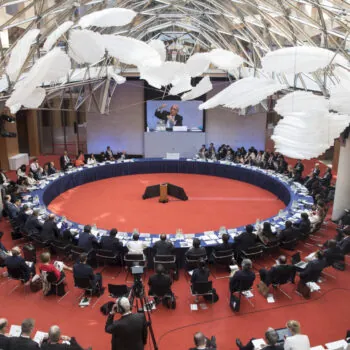The mid-term elections in the US are widely seen as having been something of a referendum on Trump. If so, despite his protestations to the contrary, he lost.
There was much media commentary on election day and immediately after about the non-appearance of the forecast Democratic wave. As is becoming increasingly frequent, these early media political judgements were wrong.
The blue wave that did indeed break as forecast was larger than the 2010 wave that brought the Tea Party Republicans to power. This flipped the House as the Democrats won 36 seats across America. It also led to a gain of seven Governor’s Mansions which will help roll back Republican gerrymandering at the census in 2020. Democrats also now hold a majority of state attorney general slots which will increase the litigation pressure on the fossil industry. Trump’s massive campaigning effort did pay off in the Senate where the Republicans made a net gain of two seats although their margin in Florida was 0.12%.
The most extraordinary aspect of these elections was the dramatic rise in turnout. At 48% this approached levels normally only seen in Presidential elections. There were even a small number of places where astonished officials found themselves counting more votes than had been cast in 2016. As you might expect, there is a mind numbing level of detail about who voted for whom, where and why. The really important, though not wholly unexpected, signal in this noise is that suburban women deserted Trump in droves. The most heartening message, though not for Trump, was the surge in younger voters who broke overwhelmingly for the Democrats who scooped up 68% of 18-29 year old voters.
Climate change and US politics
Climate change has still to become a first tier electoral issue in the US. It barely featured directly in these elections despite a year of increasingly calamitous extreme weather. In Washington, a ballot initiative to introduce a carbon tax was defeated thanks to a massive, $30 million plus, fossil industry spend, including a contribution of 42% from BP. In Colorado an initiative to restrict the access to Federal lands for oil and gas drillers was also defeated. Half of the Republican Congressmen who were members of the bipartisan Climate Solutions Caucus lost their seats. This will make it hard to continue as its rules require a member from one party to be matched with a member from the other.
Trump has increased his dominance of the Republican Party in the Senate so there is little chance of any change in the Administration’s international climate policy. The US will remain the odd one out in the G20 grouping. The President himself, in his response to the Californian wildfires, made it clear that his views on climate change have not changed. The real significance for the climate of strengthening his hold on the Senate will come not from legislative or budgetary actions, or from his Tweets, but from the appointment of Federal judges. The Supreme Court has already been tilted to make it more hostile to climate legislation. The Republicans will now seek to accelerate their appointment of right wing judges in the lower courts.
Nevertheless, taking back control of the House of Representatives has some very important implications for US domestic policy on climate change. The new intake of younger Democratic Congressmen has already made clear that it expects climate change to be a more prominent issue. It is likely that this will lead to the reinstatement of a formal climate committee, though quite what powers it will have remains to be seen.
The Trump attempt to reverse existing climate policies will now stall. It will be very difficult for new legislation to support the production and use of fossil fuels to pass since, in the US, all public spending has to be specifically agreed by both the House and the Senate. The Trump dream of a reborn coal industry is dead. The existing efforts to roll back the Obama era climate legislation are also now in trouble. The various oversight Committee’s in the House have considerable powers to challenge and inhibit the actions of the Federal Agencies responsible for Trump’s deregulation drive. Given Republican dominance of the Senate climate change is not likely to be a top political priority for Democratic legislation, but it can use its control of the House to make clear it is taking climate change seriously.
However, the real impact of the blue wave on the climate will be felt outside of Washington. There had already been a strong upwelling of response from state and city governments across the US to Trumpian denialism. This led to the extraordinary sight of Governor Brown of California convening a huge Global Action Summit in San Francisco in direct opposition to the President’s climate policy. He, Michael Bloomberg and other US civic leaders have committed to working to make sure the US meet its Paris Agreement targets anyway. The size of the popular vote for the Democrats in these elections – over 60 million votes – will greatly reinforce this momentum to act on climate change at the grassroots and not just rely on governments.


